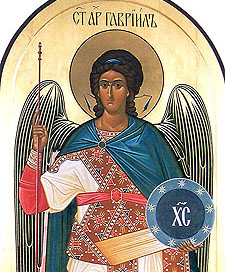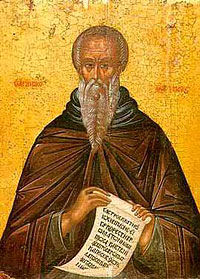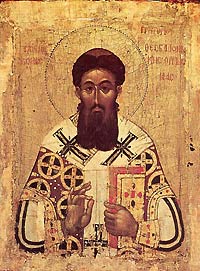Synaxis of the Archangel Gabriel
 Synaxis of the Holy Archangel Gabriel: The Archangel Gabriel was chosen by the Lord to announce to the Virgin Mary about the Incarnation of the Son of God from Her, to the great rejoicing of all mankind. Therefore, on the day after the Feast of the Annunciation, the day on which the All-Pure Virgin is glorified, we give thanks to the Lord and we venerate His messenger Gabriel, who contributed to the mystery of our salvation.
Synaxis of the Holy Archangel Gabriel: The Archangel Gabriel was chosen by the Lord to announce to the Virgin Mary about the Incarnation of the Son of God from Her, to the great rejoicing of all mankind. Therefore, on the day after the Feast of the Annunciation, the day on which the All-Pure Virgin is glorified, we give thanks to the Lord and we venerate His messenger Gabriel, who contributed to the mystery of our salvation.
Gabriel, the holy Archistrategos (Leader of the Heavenly Hosts), is a faithful servant of the Almighty God. He announced the future Incarnation of the Son of God to those of the Old Testament; he inspired the Prophet Moses to write the Pentateuch (first five books of the Old Testament), he announced the coming tribulations of the Chosen People to the Prophet Daniel (Dan. 8:16, 9:21-24); he appeared to Saint Anna (July 25) with the news that she would give birth to the Virgin Mary.
Fourth Sunday of the Great Lent
Sunday March 29, 2020
Fourth Sunday of the Great Lent
Great Lent. Food with Oil
Venerable John Lestvichnik (movable holiday on the 4th Sunday of the Great Lent).MartyrSabinas of Hermopolis, Egypt (303).whom we commemorate today
Holy Confession 10:00 A.M.Divine Liturgy 10:30 A.M
Holy Epistle:Hebrews 6:13-20Holy Gospel:Mark 9:17-31
+++
TONE 8 TROPARION
Thou didst descend from on high, O Merciful One! / Thou didst accept the three-day burial to free us from our sufferings! / O Lord, our Life and Resurrection: glory to Thee!
GLORY TO THE FATHER AND TO THE SON AND TO THE HOLY SPIRIT.
KONTAKION:
By rising from the tomb, Thou didst raise the dead and resurrect Adam. / Eve exults in Thy Resurrection, / and the world celebrates Thy rising from the dead, O greatly Merciful One!
The Fourth Sunday of Great Lent: Venerable John Lestvichnik, Troparion, Tone I —
Thou didst prove to be a freeman of the desert, an angel in a body, and a wonder-worker, O our God - bearing Father John. By fasting, vigil and prayer thou didst obtain heavenly gifts, and thou healest the sick and the souls of those who have recourse to thee with faith. Glory to Him Who gave thee strength, glory to Him Who crowned thee, glory to Him Who works through thee healings for all.
Kontakion, Tone I —
Offering ever-blossoming fruits of learning from thy book, O wise one, thou delightest the hearts of those who study it seriously, O blessed one. For it is a ladder which leads up from the earth to the heavenly and abiding glory souls who with faith honour thee.
St. John of the Ladder (Climacus)
 St. John Climacus is honored by the Church as a great ascetic and as the author of a remarkable work entitled, The Ladder of Divine Ascent, and therefore he has been named “Climacus,” or “of the Ladder.”
St. John Climacus is honored by the Church as a great ascetic and as the author of a remarkable work entitled, The Ladder of Divine Ascent, and therefore he has been named “Climacus,” or “of the Ladder.”
There has been very little information preserved about his origin. Tradition tells us that he was born in around the year 570, and was the son of Sts. Xenophon and Maria, who are commemorated on January 26/February 28. St. John came to the monastery on Mt. Sinai at age sixteen. Abba Martyrius became his spiritual father and mentor. After four years of living on Mt. Sinai, John was tonsured a monk. One of the fathers present at his tonsure foretold that John would become a great luminary of Christ's Church. St. John labored in asceticism for nineteen years in obedience to his spiritual father. After the death of Abba Martyrius, St. John chose the life of reclusion, departing to a desert place called Thola, where he lived forty years in silence, fasting, prayer, and repentant tears. It is not by chance that St. John speaks so much of repentant tears in The Ladder. "As fire burns and destroys dead wood, so do pure tears cleanse all impurity, both inwardly and outwardly." His prayer was strong and effective—this can be seen in the following example of the great ascetic's life.
Coronavirus Advice From Met. Onuphry of Kiev and Ukrainian Hierarchs
Introduction: One of the most alarming aspect of the Coronavirus epidemic is not only the disease itself, but its effect on our faith, unprecedented questions which arise because of it, and the atmosphere of uncertainty.
In these times, we present spiritual advice from the Primate of the Ukrainian Orthodox Church, His Beatitude, Metropolitan Onuphry of Kiev and All Ukraine, other Ukrainian Hierarchs.
Second Sunday Of Great Lent. St. Gregory Palamas. God Is Light
 Our Holy Father, St. Gregory Palamas
Our Holy Father, St. Gregory Palamas
Commemorated November 14/27, and on the Second Sunday of Great Lent
St. Gregory Palamas, one of the pillars of Orthodoxy, was born in 1296, probably to a noble Anatolian family in Constantinople. He and his brother went to Mount Athos in around 1318, and lived in Vatopedi and Esphigmenou Monasteries. Gregory also successfully persuaded his widowed mother, brothers and sisters to become take up the monastic life. With the encroachment of the Turks, he was forced to flee to Thessalonica, being ordained a priest there in 1326. Afterward, he took up the eremetic life at a mountain near Beroea, and eventually returned to Athos in 1331.
St. Gregory lived in very difficult times, for many heresies were creeping into the Church, and the Ottoman Empire was ever expanding, taking over Byzantine lands. In the early 1300’s he wrote on the nature of the Holy Spirit, showing the errors of the Latin view while living at the hermitage of Saint Savvas on Mount Athos. He became known as a preeminent theologian early in life, due to his many writings and for his beliefs on hesychasm.
St. Gregory is known as one of the great defenders of Orthodoxy and is most well known for his defense against the heresies of Barlaam. Gregory was asked to defend the monastic ways of the Holy Mountain from the charges of Barlaam, a monk of Calabria. Barlaam, influenced by the Latin church, believed that philosophy and human thought were the way to know God. He stated the unknowability of God in an extreme form, having been influenced by a reductionist interpretation of the writings of St. Dionysius the Areopagite. Orthodoxy had always known, through the wisdom of the Holy Fathers, that prayer and fasting are the key to knowing God. Barlaam believed that the monks of Mount Athos were wasting their time in their prayers and fasting when they should be studying the great philosophers of mankind.
St. Gregory said that the Holy Fathers and the prophets had a greater knowledge of God, because they had actually seen or heard God Himself. He taught that modern ideas about human thought and reason had no place in the Church. When asked how it is possible to have knowledge of the unknowable God, he showed the difference between knowing God in His essence or person and knowing God in his energies or being. It became clear that one could not find God in the logic of this world. He taught the Orthodox knowledge that it remains impossible to know God in His essence or person. However, with sufficient prayer and fasting and turning oneself over to God, through purification of one's soul, anyone can come to know Him in His energies and being.
The Barlaam heresies spanned many years and two phases. Due to acts of political power struggles in Constantinople, Gregory was imprisoned to prevent him from speaking the Truth. As the political struggle increased, his accusers multiplied because he would not yield to their heresies, and he opposed the new emperor due to the emperor's acceptance of the heresies.
When St. Gregory criticized Barlaam's rationalism, Barlaam replied with a vicious attack on the hesychastic life of the Athonite monks. Gregory's rebuttal was the Triads in defense of the Holy Hesychasts (c. 1338), a brilliant work whose teaching was affirmed by his fellow Hagiorites, who met together in a council during 1340-1341, issuing a statement known as the Hagioritic Tome, which supported Gregory's theology.
A synod held in Constantinople in 1341 also supported St. Gregory's views, condemning Barlaam. Later, in 1344, the opponents of hesychasm secured a condemnation for heresy and excommunication for Gregory, but the saint's theology was reaffirmed at two further synods held in Constantinople in 1347 and 1351. Collectively, these three synods in Constantinople are held by many Orthodox Christians and several prominent theologians to constitute the Ninth Ecumenical Council. Between the latter two synods, Gregory composed the One Hundred and Fifty Chapters, a concise exposition of his theology.
In 1347, he was consecrated Archbishop of Thessalonica, but the political climate made it impossible for him to take up his see until 1350. During a voyage to the Imperial capital, he was captured by the Turks and held in captivity for over a year. He reposed in 1359, and was glorified by the Orthodox Church in 1368.
The second Sunday of the Great Fast is called the Sunday of Gregory Palamas in all Orthodox Churches. A full service was composed for his feast day, November 14/27, by the Patriarch Philotheus in 1368. St. Gregory’s holy relics are kept in the Cathedral of Thessalonica.
God is Light
On the Second Sunday of Great Lent, we celebrate the memory of St. Gregory Palamas, Archbishop of Thessalonica. On this day, the Holy Church speaks to us about the mystery of light, which we must come to know, if we want to behold the Resurrection of Christ. St. Gregory of Thessalonica and the theological arguments of the fourteenth century connected with his name taught that the light of the Transfiguration is uncreated light. Refuting the heresies of the western theologians, this teaching reminded Christians of the words of the Scripture stating that God is light. By confessing God the Father and God the Son, Light from Light, true God of true God, we believe that God the Light created another light—the one described in the book of Genesis: “God said, let there be light.”
These dogmatic questions were not abstract or removed from the life of the Church. They should not be removed from us, either. It is wrong to look at them as simple theological or scholarly discussions that have no relation to our life. That would mean only one thing: that the light about which God speaks to us—the light in which there is no darkness—will remain unseen to us, and we do not regret or repent that we remain in darkness. All the problems in the Church are, in the final analysis, bound up with the fact that certain mysteries of faith become abstract. They cease to be living, essential questions that decide our fate; and we lose the depth of faith, and the fullness of our Christian calling, which we should be realizing in the Church.
Archpriest Alexander Shargunov






